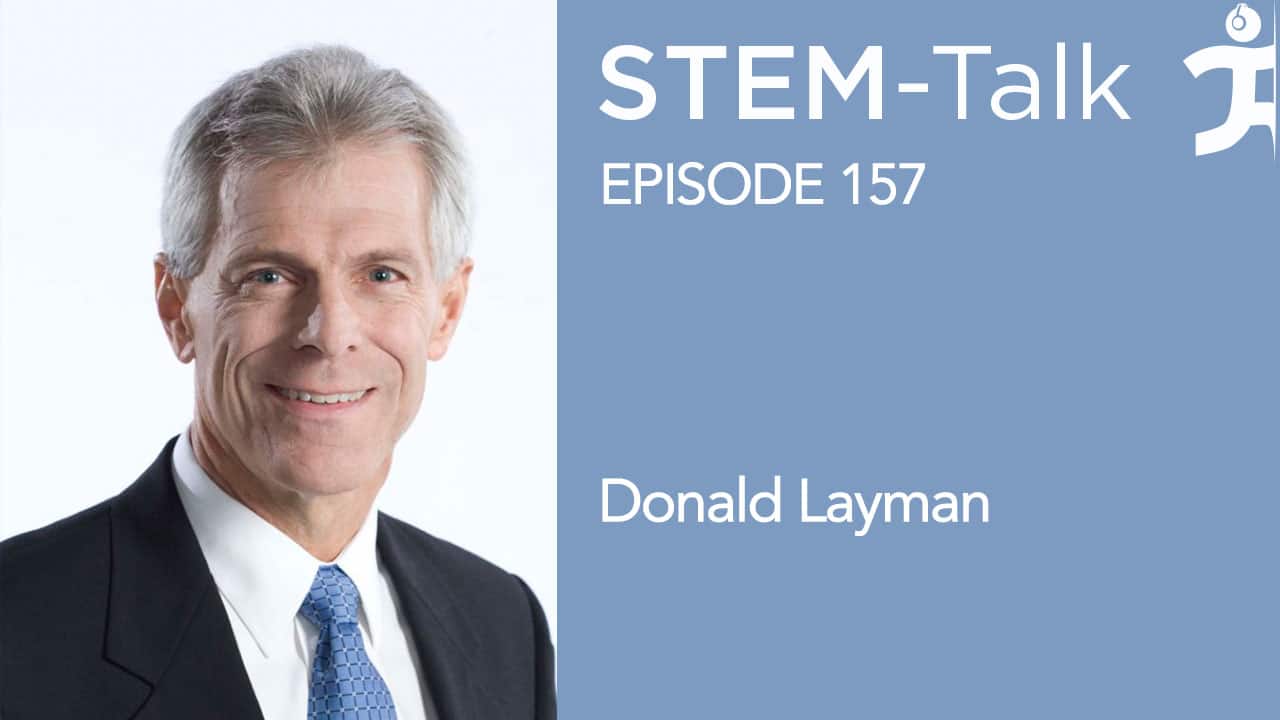STEM-Talk
Episode 157: Don Layman on the role of dietary protein in muscle, health, and disease
// Sep 14, 2023

Today we have one of the world’s foremost authorities on dietary protein and amino acids, Dr. Donald Layman. He is known for his extensive research on muscle development as well as his studies of metabolic regulation for obesity, diabetes, and cardiovascular disease.
Don is a professor emeritus in the Department of Food Science and Human Nutrition at the University of Illinois Urbana-Champaign. He spent 31 years on the faculty before stepping away in 2012. Much of Don’s research over the years investigated the impact of diet and exercise on adult health problems related to obesity, type 2 diabetes and metabolic syndrome.
His lab at Illinois particularly focused on understanding metabolism. He conducted clinical trials for nearly two decades that helped create a new understanding about how to optimize people’s macronutrient balance and metabolism. In addition to his work on metabolism, Don has also conducted extensive research into ways to enhance body composition, increase energy levels and monitor blood sugar.
Today Don works as Director of Research for the American Egg Board and is a nutrition consultant for the National Dairy Council and The National Cattlemen’s Beef Association. He also is the Chief Science Officer for Qivana, a natural products marketing company that promotes the weight-loss program that Don developed in his lab at the University of Illinois.
Show notes:
[00:04:02] Marcas asks Don what it was like growing up on a farm in a small town in northern Illinois. [00:04:29] Marcas asks how small the town was that Don grew up in. [00:05:16] Don explains how he first became interested in science. [00:05:39] Don talks about how he realized in college that he wasn’t as good at math as he thought he was. He shares how this shifted his focus away from chemical engineering. [00:06:27] Marcas asks if Don’s natural intuition and interest for biochemistry stemmed from growing up on a farm. [00:07:10] Ken mentions that as Don was studying biochemistry, he started looking into protein synthesis with a professor by the name of Arlen Richardson, who was known for his aging research. Ken asks Don to talk about this period and how his interest in protein and muscle evolved. [00:08:27] Marcas asks Don to explain for listeners the importance of protein as it relates to metabolism and what he means when he talks about protein turnover. [00:09:36] Marcas mentions that we hear a lot about the need to maintain muscle as we grow older, but that back in the ‘70s and ‘80s when Don was starting his career, there wasn’t much of a focus on muscle, except in terms of athletic performance. Marcas goes on to explain that largely because of Don’s research, we now know that protein is critical in terms of helping people stay healthier as they age. Marcas asks Don to give a sense of just how important protein is for our health span and aging. [00:12:35] Ken asks if it is true that the inefficiency in muscle protein synthesis begins as early as one’s thirties. [00:14:11] Ken asks Don to talk about the right amount of protein an individual should consume and mentions that there is much confusion on this issue, largely due to the food pyramid’s recommended daily allowance for protein of 0.8 grams per kilogram of body weight. [00:15:51] Ken mentions that Don has talked in the past about how 40 percent of women who are 60 and older consume less than the RDA for protein, which is likely the bare minimum. Ken asks if it is reasonable to say that a plant-based diet for older women could be risky. [00:17:13] Ken asks Don to address the claims that high-protein diets are not good for you, and that too much protein can harm your liver and kidney. [00:18:47] Marcas shifts gears to talk about the quality of protein consumed. Marcas explains that it is much easier for carnivores to get the right amount of protein than vegans, largely because the amino acid leucine is vital for muscle repair and replacement, and leucine is very low in plant-based foods. Marcas asks Don to talk about the difficulty vegetarians and vegans have in consuming enough protein. [00:21:07] Ken mentions that we hear a lot about the need to adopt a more plant-based diet, but that Don is on record saying that we already have a plant-based diet. Ken asks Don to elaborate on this. [00:22:23] Marcas asks Don to talk about America’s plant-based diet in relationship to the obesity epidemic. [00:23:18] Marcas shifts gears to talk about Don’s 1998 paper that set out to define the role of protein in regulating muscle protein synthesis at the level of translation initiation, which is the rate-limiting step in protein synthesis. Marcas asks Don to talk about this study and its significance. [00:26:00] Ken mentions that Don followed up the aforementioned 1998 paper with a parallel article titled “Leucine Supplementation Enhances Skeletal Muscle Recovery in Rats Following Exercise.” This study showed a link between protein, specifically leucine, to muscle initiation factors. Ken asks Don to talk about the significance of this paper. [00:28:08] Ken pivots to discuss mTOR, or mammalian target of rapamycin, and explains that there’s confusion about mTOR and protein because public discourse about mTOR is full of mixed signals. Ken explains that we have had several guests on STEM-Talk to discuss mTOR, including David Sabatini, episode 70, who discovered mTOR. Ken asks Don to give an overview of mTOR. (Some other STEM-Talk interviews that covered mTOR include Keith Baar, episodes 62 and 63, and Matt Kaeberlein, episode 139.) [00:30:33] Ken mentions the difference between chronic and pulsatile activation of mTOR. [00:32:58] Ken asks Don about his 2005 paper titled “Dietary Protein and Exercise Have Additive Effects on Body Composition,” a paper that demonstrated the synergy of protein and exercise. [00:36:50] In a follow-up question, Marcas asks how this protein-diet and exercise combination that Don proposes can help in the maintenance of weight loss. [00:39:28] Ken asks about the advantages of protein in terms of thermogenesis and satiation. [00:42:04] Marcas asks Don what sort of exercise people should do to build muscle after correcting their protein intake. Marcas asks if exercise should be focused on muscle building or aerobics. [00:45:27] Ken mentions that Marcas led a clinical trial in 2011 at the University of Alabama Birmingham that showed how men and women in their 60s and 70w who underwent supervised weight training developed muscles that were as strong as those of the average 35- to 40-year-old. Ken asks Marcas to share how this study demonstrated that the neuromuscular system of older adults could be robustly responsive to resistance training. [00:48:54] After describing his clinical trial that looked at supervised weight training for men and women in their 60s and 70s, Marcas asks Don for his thoughts on prescriptive dosing of exercise for older adults. [00:51:45] Marcas asks Don if there is an optimal timing of protein intake relative to exercise to get the maximum benefit. [00:53:42] Marcas mentions Don’s website “Metabolic Transformation,” and the work Don has done with his former student Dr. Gabrielle Lyon on the concepts of muscle centric health and protein centric diets. [00:56:46] Ken asks Don to walk listeners through what happens while we sleep and why it is important to start the day with a substantial amount of protein at breakfast. [00:59:21] Marcas asks, considering Don’s recommendation of forty grams of protein at breakfast, what Don generally eats for breakfast. [01:01:46] Ken asks how many grams of protein people should aim for at dinner and lunch. [01:03:29] Marcas circles back to intermittent fasting and time restricted eating and asks Don if he thinks they are effective strategies for weight loss and maintenance. [01:06:02] Marcas mentions that Don’s former student, Gabrielle Lyon, has a book coming out that builds off a lot of the research she and Don have worked on together. Marcas asks Don what he knows about the book, which is titled “Forever Strong: A New Science-Based Strategy for Aging Well.” [01:07:14] Ken asks Don about a panel discussion that Don was part of at the American Society of Nutrition conference in Boston over the summer. Don talks about some of the key points that came out of the discussion, which was titled “The Global Nutrition Transition: Improving Nutrient Analysis and Monitoring of Metabolic Markers.” [01:10:07] Ken closes the interview asking how Don spends his time now that he has stepped away from his day-to-day duties at Illinois.Links:
Metabolic Transformation website






